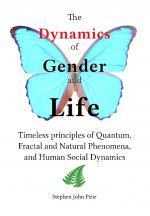This section 'Our push-pull reality' further analyses and Tables (Tables 5.8 and 5.9) the nature of imagination, freedom, ego, choice, boundaries, past and future and how they all inter-relate and affect each other.
[Excerpt Be and Become, © ProCreative, Sydney 2000]
If we reflect upon the role of “vision” in our lives, we can more fully appreciate the means by which reality functions. As mentioned earlier, the whole (gestalt) sets the overall constraints within which the parts then cooperate to bring about the desired results or goals. When we inject the element of time into these considerations, we begin to gain a firm awareness of the intimate operation of reality.
We can understand that the future (being as it is correlated with the Unknowable-Whole) is the downward causation upon our present reality. In other words, where we are going helps determine how we behave in the present. Refer Table 5.8
|
Unconscious |
Conscious |
|
Collective-Unconscious |
Ego, Choice |
|
Higher-Self |
Individuality |
|
Future |
Past |
|
Goals, Vision |
Experience, Habit |
|
Emotions |
Thoughts, Ideas |
|
Unpredictable |
End-product reality |
This idea that the end product reality (emerges from an unpredictable ground) -- that what we experience cannot be predicted from the outset is of fundamental importance in understanding how reality works. Physicist Davies parallels these considerations in his book The Cosmic Blueprint, in part by quoting science writer Louise Young:
Louise Young, for example, in lyrical style, refers to the universe as ‘unfinished’, and elaborates Popper’s theme: ‘I postulate that we are witnessing—and indeed participating in—a creative act that is taking place through time. As in all such endeavours, the finished product could not have been clearly foreseen in the beginning’. She compares the unfolding organization of the cosmos with the creative act of an artist: ‘...involving change and growth, it proceeds by trial and error, rejecting and reformulating the materials at hand as new potentialities emerge’.1
In a similar manner, the Scottish Himalayan Expedition embellished Goethe’s work to offer
their perspective:
Until one is committed, there is hesitancy, the chance to draw back, always ineffectiveness. Concerning all acts of initiative and creation, there is one elementary truth, the ignorance of which kills countless ideas and splendid plans: that the moment one definitely commits oneself, then Providence moves too. All sorts of things occur to help one that would never otherwise have occurred. A whole stream of events issues from the decision, raising in one’s favour all manner of unforeseen incidents and meetings and material assistance, which no man could have dreamed would have come his way.2
This is not unexpected in view of the Uncertainty Principle introduced in the previous chapter. The future must remain fundamentally unpredictable, so attempting to perfectly define or predict it is indeed misguided and futile. In terms of downward causation, the future is guiding the present. In other words, the “toality” (inseparable duality) of existence is that the future helps drive or guide the present. The present also determines which future we will ultimately attract, allow or create.
The interplay between the past, present and future (i.e the now-moment) is where and how surprise and magic solidifies into practical experience. Up to this point however, I haven’t made mention of the role of the past in our reality creation. The past serves to mould our unimaginative expectations. Refer Table 5.9.
|
Feminine |
Masculine |
|
Imagination |
Knowledge |
|
Left-wing (politicians) |
Right-Wing (Politicians) |
|
Visonary |
Ordered, Unimaginative |
|
Creative |
Predictable, Reliable |
|
Future-orientated |
Past-orientated |
If we review the Table of One and All we can appreciate why right-wing materialistic politicians are usually conservative and a bit dull—they (being past orientated) seek to conserve that which has been (the past). On the other hand, left-wing politicians are often visionary, being as they are orientated towards the future. We can further appreciate that conservative politicians are better at running the nation’s economy because they are more focused on structure and order. Left-wing politicians (and artists) have often been inept when it comes to matters financial.
 "The Dynamics of Gender and Life" ebook is now available at
"The Dynamics of Gender and Life" ebook is now available at